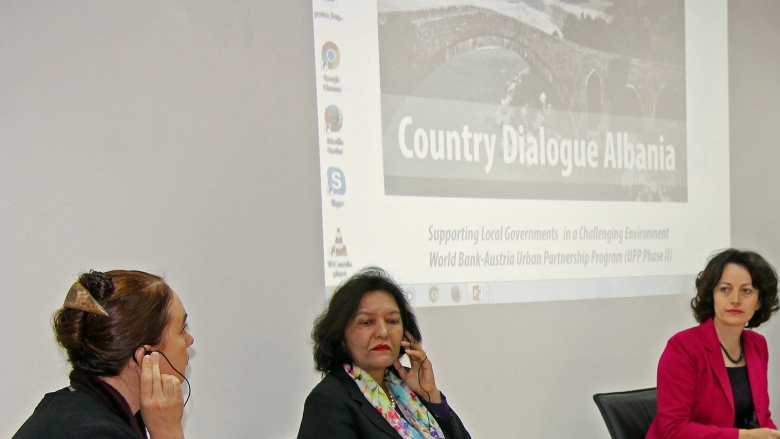The World Bank in cooperation with Co-PLAN, Institute for Habitat Development and Partners Albania organized in Tirana on November 4, 2015, the one-day event “Country Dialogue Albania-Strengthening local government capacity in South East Europe” under the framework of the World Bank-Austria “Urban Partnership Program.”
This dialogue was considered timely to discuss the administrative and fiscal challenges to move forward on effective implementation of Government’s Territorial Reforms, the decentralization strategy and cross-cutting issues. A wide representation of more than 150 participants from both central and local government, as well as civil society stakeholders helped in broadening the dialogue to support Local Governments in their stock-taking and consolidation process.
The event was opened by the executive director of Co-PLAN, Mr. Dritan Shutina, who briefly introduced the objectives of the activity, UPP program and its continuity.
The World Bank County Manager Mrs. Tahseen Sayed addressed the participants focusing on the World Bank programs and initiatives to support Albania’s growth and development.
“This engagement is an important part of the recently endorsed World Bank Group’s five year Country Partnership Framework for Albania, which acknowledges the key role of local governments in improving the quality and efficiency of service delivery that is inclusive and equitable," said Mrs Tahseen Sayed.
"The territorial reforms initiated by the Government of Albania are timely and provide the opportunity to support the fiscal and administrative decentralization agenda focusing on sub-national financing and associated local governance reforms. In support of this process, the World Bank has initiated a sub national Finance and Governance Review that aims to provide the analytical underpinning for our future engagement at the local level. Our assessment will benefit from the extensive work already done by Government and international partners that have been providing technical and advisory support for territorial reforms. We consider Albania’s local government reforms a key step towards bringing services and decisions closer to the people.”
Minister of Urban Development Mrs. Eglantina Gjermeni and the advisor of the Minister of State for Local Governance Issues Mr. Enea Hoti, welcomed the event and expressed their insights on the post-territorial reform situation, specifically on the challenges of managing the new territories and challenges of consolidation and operationalization of Local Governments.
The event was organized on three main themes, followed by discussion panels.
The first panel focused on “Recent developments on fiscal decentralization and local financial management” and panel discussions reflected several challenges that the new administrations faced after the local elections and following the reforms, especially in the stocktaking process in territorial, financial and legislative aspects. The self-assessment tools will help these new municipalities consolidate databases, analyze trends, assess investment needs and relate them spatially to facilitate their translation into concrete implementable project proposals.
The second panel focused on “Managing new territories and representation: Challenges & Available Instruments” in the new environment after the Territorial Administrative Reform and Local Elections. The focus of this panel was to introduce instruments and practical tools that will be useful in facilitating the stocktaking process for the new Local Governments in terms of local finance and territorial planning and management.
The third panel discussed on “Integrity Building and Anticorruption: a continuous challenge in local governance." Discussions took place on how the Social Sustainability and Citizen Engagement and Integrity Building approaches help Local Governments assess the social accountability mechanisms in place, as well build integrity in local government administration. Good practices from the implementation of Anti-Corruption initiatives in the Municipalities of Kuçova and Lezha were shared with all participants.
The Country Dialogue marked the start of the second phase of the Urban Partnership Program (UPP II) that is being implemented in South-East Europe. UPP II aims to strengthen the capacity of local governments in SEE and equip local elected officials, city administrators and technical staff with practical tools for decision-making, to effectively manage urban development for inclusive and sustainable growth.
The first phase of the Urban Partnership Program (2011-2014) was shaped by the demand of municipalities and local government associations and was focused on key dimensions of local government, including municipal finance, urban planning and land management, urban governance/ anti-corruption, and social accountability.
